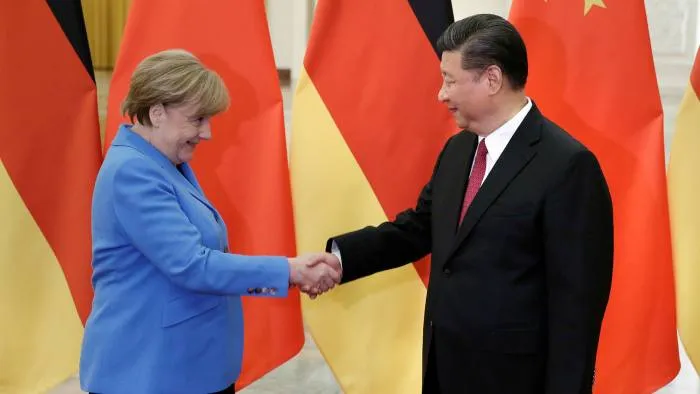
Germany’s carmakers cannot believe their good fortune. Chinese consumers have ridden to their rescue again, a decade after pulling them out of a hole following the financial crisis.
“It’s almost too good to be true,” Ola Kallenius, chief executive of Daimler, said last month as he cheered a 23 per cent increase in sales in China in the third quarter. Prevented by coronavirus from taking an expensive foreign holiday, wealthy Chinese have been splashing out on luxury S-Class Mercedes cars instead.
Robust Chinese demand has helped Germany’s auto manufacturers and their suppliers to offset weaker European and US markets still afflicted by the pandemic. But it has also revived concerns that German industry is too dependent on China. And it has raised questions about whether Berlin will be willing to respond to growing pressure in the EU for a stronger line towards Beijing and to embrace a new transatlantic partnership on China under a Biden administration.
Daimler, which has two large Chinese shareholders, sells nearly 30 per cent of its Mercedes cars in China. It accounts for about 11 per cent of group revenues. For several companies in the Dax 30 index, China represents at least a fifth of sales including BMW, chipmaker Infineon and plastics manufacturer Covestro. Likewise, Volkswagen is estimated to generate a similar proportion of its sales in the country last year, selling nearly 40 per cent of its vehicles there.
China is now the most important car market worldwide, said Stefan Bratzel, director of the Center of Automotive Management. It is also a testing ground for autonomous driving, electric vehicles and other technologies.
“But I’m also worried that the dependency of German auto manufacturers in China is too high,” Professor Bratzel added.
Even chancellor Angela Merkel, who has stuck religiously to her faith that western powers can shape China’s conduct through trade and investment, last month urged German businesses to diversify and build up other export markets in Asia.
German carmakers are particularly susceptible to Chinese pressure. Operating multiple factories — VW has 26 in China — requires the goodwill of the authorities. VW has been embarrassingly circumspect about its plant in Xinjiang, the region where the Muslim Uighur population is being repressed. Desirable brands make for an easy target for any consumer backlash. China’s ambassador to Berlin last year issued a thinly veiled threat that German marques would be at risk if the Federal Republic bowed to US pressure and banned Huawei from its 5G telecoms network.
The pandemic has accentuated the dilemma for Europe of reconciling its economic dependence on the Chinese market with its desire for greater geopolitical autonomy, said Nils Redeker and Anna Stahl, in a report for Berlin’s Hertie School. But, they added, the idea of dependence should not be overplayed. Even after 15 years of booming trade, China still accounts for only 8 per cent of German exports while Germany takes in 5 per cent of China’s.
Max Zenglein, chief economist of the Mercator Institute for China Studies, says in a new paper that dependence cuts both ways. Europe is, he adds, an important provider of foreign investment and job creation in China. It is also a large market for Chinese exporters and a vital source of technical knowhow, particularly in advanced machinery, at which Germany excels. Beijing may be trying to reduce its reliance on foreign industrial technology but it “remains a difficult, costly and time-consuming effort”.
Mr Zenglein argues a “growing perception of dependence has enabled China’s government to instil in Europe the assumption that friendly political relations are necessary for good economic relations”. Chinese commercial retaliation in Europe is rare. But the possibility had created “pre-emptive obedience” in the boardrooms and chancelleries of Europe, he added.
That may be particularly true of the car industry, which is also fighting a bigger battle for technological survival. But in other sectors, the mood has hardened.
Asked about Hong Kong in an interview in July with Frankfurter Allgemeine Zeitung, Nicola Leibinger-Kammüller, chief executive of family-owned machine tool maker Trumpf, said: “Beijing is pursuing the goal of gradually conquering the west and is proceeding very systematically.
“It is negligent that we as Europeans do little to counter this. However, withdrawing from China is not an option.” Not much pre-emptive obedience there.




















